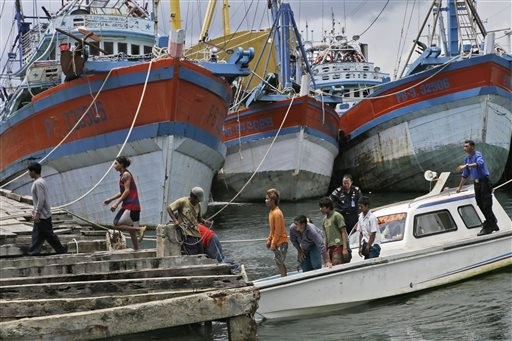Popular Reads
Top Results
Can't find what you're looking for?
View all search resultsPopular Reads
Top Results
Can't find what you're looking for?
View all search resultsUS: Forced labor continues on Thai fishing vessels
Change text size
Gift Premium Articles
to Anyone
 Burmese fishermen arrive at the compound of Pusaka Benjina Resources to report themselves for departure to leave the fishing company in Benjina, Aru Islands, Indonesia as hundreds of foreign fishermen rush at the chance to be rescued from the isolated island where an Associated Press report revealed slavery runs rampant in the industry, April 3, 2015. (AP/Dita Alangkara)
Burmese fishermen arrive at the compound of Pusaka Benjina Resources to report themselves for departure to leave the fishing company in Benjina, Aru Islands, Indonesia as hundreds of foreign fishermen rush at the chance to be rescued from the isolated island where an Associated Press report revealed slavery runs rampant in the industry, April 3, 2015. (AP/Dita Alangkara)
T
he US State Department said Wednesday that forced labor on Thai fishing vessels has continued in the past year despite legal reforms and arrests following an Associated Press investigation into the country's seafood industry.
The department made the assessment in its annual global review of human rights practices, released in Washington by Secretary of State John Kerry. The report covers the 2015 calendar year.
The report finds that the Thai government has reaffirmed its "zero tolerance" policy for human trafficking and updated many laws that enhance regulatory powers and increase punishment for violations. An amended anti-trafficking law provides protection to whistleblowers and gives authorities the power to halt operations temporarily or suspend licenses of businesses and vehicles involved in human trafficking.
But the report says, "the lack of clarity in law and practice on what constitutes forced labor or debt bondage undermined the government's efforts to identify labor trafficking victims and prosecute forced labor."
Reports of abusive work environments, including forced labor, continued in many sectors, including Thai-flagged seagoing trawlers and labor-intensive industries such as food and seafood processing facilities, according to the department. Up to 90 percent of workers in the seafood processing industry were migrant workers, it says.
The department cites the AP investigative series on slavery in the seafood industry that resulted in the rescue of 2,000 men, a dozen arrests, millions of dollars' worth of seizures, closure of some shrimp-peeling sheds, and proposals for new national laws.
The men, mostly from Myanmar, Cambodia and Laos, were recruited in Thailand and brought to Indonesia using fake travel documents where they were subjected to brutal labor abuses. Some had been enslaved for years or decades.
Later in the year, the department will issue a separate report that focuses on human trafficking and exploitative labor and ranks governments on their performance in combating those abuses. Thailand, along with Iran, Syria and Zimbabwe, was last year among 23 countries receiving the lowest ranking in the annual US assessment.






